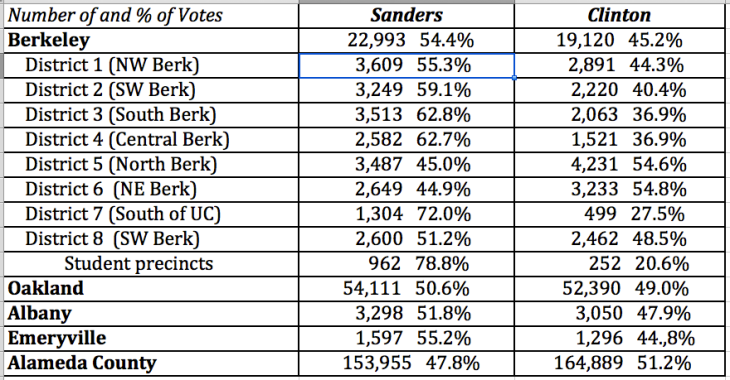How Berkeley Voted: 2016 June Primary Election
June 24, 2016 by Rob Wrenn
Bernie won Berkeley!

Bernie Sanders won Berkeley in the Democratic presidential primary with 54.4% of the vote to 45.2% for Hillary Clinton, not a huge margin. Clinton did best in the City’s wealthiest areas, the northeast Berkeley hills in District 6, in the hills above Claremont Ave. in District 8, and in the windy street precincts in the northern part of District 5. These areas have historically favored “moderate” candidates in local Berkeley election.
Sanders swept the flatlands, except for two precincts in District 1, winning South Berkeley, West Berkeley and the central part of the city and sweeping the areas near the UC campus, Southside, Northside and Downtown by large margins. He did well in the areas where progressive candidates usually fare well in local elections.
Results by city and precinct:

Note: Student precincts consists of precincts in the area south of campus between Dwight Way and campus and 1 consolidated precinct on the near Northside, that includes the Foothill dorm. Berkeley results include write-ins; Oakland, Albany and Emeryville and county results are based only on vote for candidates on the ballot.
Turnout
Turnout Turnout in Berkeley was up this year compared to the uncontested 2012 California Democratic presidential primary, but was down compared to 2008 when Clinton ran against Obama for the nomination. In that hotly contested 2008 Democratic Presidential primary, which took place in February that year, turnout was 64.5% in Berkeley, with Obama defeating Clinton by a huge margin: 27,352 to 11,505. This year turnout was 58.0%.
Student turnout was very low, which is not surprising given that the primary took place after most undergraduates had left town for the summer. No doubt some students opted to register and vote in the hometowns they returned to when the semester ended.
This year, 833,803 people were registered to vote in Alameda County, and 49.3%, turned out to vote countywide. Of 480,475 registered Democrats in the county 59% voted. In addition, a little over table 140,000 Decline to State (DTS) voters cast Democratic ballots.
In Berkeley, 45,933 ballots were cast. In the 2014 November gubernatorial election, 40,301 votes were cast by Berkeley voters. 47,303 voted in the presidential primary election in 2008. A record 66,703 votes were cast in the 2008 November presidential election.
Turnout may have been dampened by media reports before the election that declared that Clinton had enough delegates, with super delegates included, to secure the nomination.
Turnout in Berkeley, Selected Elections, 2008-2016

Trump gets less than 1% in Berkeley
The vast majority of the Berkeley voters’ ballots cast, 42,476, were cast in the Democratic primary. Donald Trump received 454 votes in the Republican primary; Kasich got 306. So Trump was supported by slightly less than 1% of the voters who cast ballots in Berkeley.
9th State Senate District
Former Assemblymember and District 1 councilmember Nancy Skinner easily beat Sandré Swanson in Berkeley, crushing him with 24,130 votes (62.6%) to Swanson’s 9596 votes(24.9% ). Other candidates got 4799 votes. Skinner swept every district in Berkeley. In the Oakland portion of the 9th District, Skinner beat Swanson by a much narrower margin of 44,012 to 40,650. Skinner and Swanson will face each other again in November.
Contra Costa County had not finished counting ballots as of June 22, but the 9th district result to date, including votes reported so far in Contra Costa County portions of the district is 48.0% for Skinner and 30.6% for Swanson.

I am glad Bernie won in Berkeley. I voted for him. My vote has not yet been counted! I just checked. I wonder how many other Bernie votes have not been counted and wonder if they will be.
They will be. The Chronicle did an extensive story on the incredibly slow, but thorough, California count. On Sunday, I think. It’s always been that way, apparently. There are some genuine reasons why the final count takes time (such as posted ballots can arrive 3 days after polling day) but I still don’t understand why it should take a month!